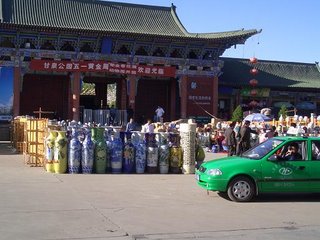 I had my birthday this past Tuesday, and since even ages in China are different (add roughly a year to your Western age), I feel like I've jumped from 22 straight to 24. Where have the years gone. Me and Cynthia went all out and ate at Zhangye's one and only Western restaurant, an overpoweringly classy place in the city center meant for Zhangye's "see-and-be-seen" set, assuming there is one. It's a quite expensive place, by which I mean the beer is $1.50 instead of 25 cents. Out of some sort of principle I was avoiding the place and I think we were the first teachers I know to go, but it had its charms, not the least of which being the "Welcome Aboard!" lifesaver at the entrance. I also liked the sign on the stairs that said "watch your head" in Chinese only, the only people who would possibly need to watch their head being foreign visitors. After about five minutes one of the unnecessarily numerous waitresses came over to switch our forks and knives because they were on the wrong sides (obviously, we had noticed immediately and were completely outraged). This would be the first fork I've seen in a restaurant in China, and the temptation to obnoxiously demand chopsticks when the meal came was very strong. The pizza we ordered, my first in months, was not all it could have been, but I did love the chance to order a Carlsberg beer for the first time since Denmark.
I had my birthday this past Tuesday, and since even ages in China are different (add roughly a year to your Western age), I feel like I've jumped from 22 straight to 24. Where have the years gone. Me and Cynthia went all out and ate at Zhangye's one and only Western restaurant, an overpoweringly classy place in the city center meant for Zhangye's "see-and-be-seen" set, assuming there is one. It's a quite expensive place, by which I mean the beer is $1.50 instead of 25 cents. Out of some sort of principle I was avoiding the place and I think we were the first teachers I know to go, but it had its charms, not the least of which being the "Welcome Aboard!" lifesaver at the entrance. I also liked the sign on the stairs that said "watch your head" in Chinese only, the only people who would possibly need to watch their head being foreign visitors. After about five minutes one of the unnecessarily numerous waitresses came over to switch our forks and knives because they were on the wrong sides (obviously, we had noticed immediately and were completely outraged). This would be the first fork I've seen in a restaurant in China, and the temptation to obnoxiously demand chopsticks when the meal came was very strong. The pizza we ordered, my first in months, was not all it could have been, but I did love the chance to order a Carlsberg beer for the first time since Denmark.That evening me and several foreign teachers, along with Miss Mao and three students Andrew knows, met at our Xinjiang restaurant hangout. Our dutar-playing friend Aqbar has sadly returned to Xinjiang permanently, but the kebabs will keep us coming back. I received some good gifts, such an enormous bouquet from Miss Mao, an appealingly ridiculous Steaven Segal film called "The Foreigner" from Andrew, not one but two model boats, and a book of old Chinese songs from Gary that includes such stirring hits as "The East is Red" and "Our Leader Mao Zedong". One of my male students stopped by my home earlier in the evening to give me a gift as well: a DVD of Disney cartoons, which he may actually want back as far as I can tell. I also got a call from a group of students to wish me happy birthday (Andrew obviously spread the word), which was very nice but I might have preferred they didn't call at midnight when I was already asleep.
Some general thoughts I'm forming on Chinese education: something needs to be changed when you put your high school students in school until 10:30pm for six and a half days a week, but when I ask University students "what is this article about?" after they've just read it, there is 30 seconds of silence while they look down at the paper and then just quote from it. They don't seem to be taught things like "summarize this in your own words", or thinking critically, forming your own opinions and backing them up, or even raising your hand to volunteer the answer when you know it. I find many things I respect about Chinese culture, some of them being superior to the West (moral and family values, attitudes to life and working, attention to food, knowing how to relax), but education is one area I see no sense in the way things are done here. Memorization is king, and education is seen as the accumulation of more and more knowledge rather than thinking for yourself. During my office hours today I was asked, "what is the number of words I need to know in order to master English?"; when's the last time you sat back and counted how many words you know in English, or thought it had anything to do with how well you can speak English? Another student told me he was actually criticized by a Chinese teacher because he likes to practice English outside of the classroom. From what I'm told, in a Chinese English teacher's classroom there is more lecturing than communicating going on, and students are quickly and frequently criticized for mistakes. It's no wonder that many of them are so shy about speaking up, and it's so difficult to get a response when I ask general questions to the class. Probably of more use than the English I can teach the students are the Western ideas I can expose them to, and I was glad to see some students in office hours today getting beyond the usual "can you cook Chinese food?"-type questions to find out more about American culture and education.

No comments:
Post a Comment